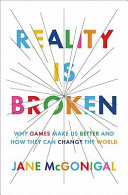A good game teaches you how to play it
What you eventually discover as you continue to play is that Portal is a game about escaping from rooms that operate according to rules you are unaware of. You learn that each room is a puzzle, increasingly booby-trapped, and the game requires you to understand more and more complex physics in order to get out. If you don’t teach yourself the physics of each new room— that is, if you don’t learn the rules of the game—you’ll be stuck there forever, listening to the AI system repeat herself.
Many, if not most, computer and video games today are structured this way. Players begin each game by tackling the obstacle of not knowing what to do and not knowing how to play. This kind of ambiguous play is markedly different from historical, predigital games. Traditionally, we have needed instructions in order to play a game. But now we’re often invited to learn as we go. We explore the game space, and the computer code effectively constrains and guides us. We learn how to play by carefully observing what the game allows us to do and how it responds to our input. As a result, most gamers never read game manuals. In fact, it’s a truism in the game industry that a well-designed game should be playable immediately, with no instruction whatsoever.
A game like Portal turns our definition of a game on its head, but doesn’t destroy it. The four core elements of goals, rules, feedback, and voluntary participation remain the same—they just play out in a different order. It used to be that we were spoon-fed the goal and the rules, and we would then seek feedback on our progress. But increasingly, the feedback systems are what we learn first. They guide us toward the goal and help us decode the rules. And that’s as powerful a motivation to play as any: discovering exactly what is possible in this brand-new virtual world.
Notes:
Folksonomies: gamification
Taxonomies:
/science/physics (0.621393)
/hobbies and interests/games/board games and puzzles (0.484534)
/business and industrial (0.447287)
Keywords:
game (0.963547 (positive:0.137173)), brand-new virtual world (0.777095 (positive:0.543040)), AI system repeat (0.635542 (neutral:0.000000)), rules (0.634299 (positive:0.078591)), good game (0.632286 (positive:0.749189)), predigital games (0.631336 (neutral:0.000000)), complex physics (0.629684 (neutral:0.000000)), new room— (0.628520 (positive:0.274991)), ambiguous play (0.611866 (positive:0.407567)), video games (0.607499 (negative:-0.370570)), core elements (0.596271 (neutral:0.000000)), game space (0.595706 (neutral:0.000000)), feedback systems (0.595655 (positive:0.462537)), game manuals (0.594540 (neutral:0.000000)), game industry (0.587255 (positive:0.315122)), different order (0.574514 (positive:0.404840)), Portal (0.494287 (positive:0.749189)), goal (0.478392 (positive:0.041453)), obstacle (0.453007 (negative:-0.562831)), rooms (0.449430 (negative:-0.315659)), puzzle (0.448304 (positive:0.620946)), game—you (0.446445 (negative:-0.393442)), instructions (0.445551 (neutral:0.000000)), Players (0.444727 (negative:-0.562831)), guides (0.444493 (positive:0.412642)), way (0.443939 (negative:-0.370570)), motivation (0.443751 (positive:0.604072)), input (0.443720 (positive:0.390928)), kind (0.443234 (positive:0.407567)), gamers (0.443104 (negative:-0.460067))
Entities:
AI:Organization (0.706272 (neutral:0.000000)), virtual world:FieldTerminology (0.669001 (positive:0.543040))
Concepts:
Game (0.986996): dbpedia | freebase | opencyc
Video game (0.986827): dbpedia | freebase | opencyc
Play (0.941421): dbpedia | freebase | opencyc
Games (0.707190): dbpedia
Toy (0.648821): dbpedia | freebase | opencyc
Puzzle (0.645297): dbpedia | freebase | opencyc
Teacher (0.625346): dbpedia | freebase | opencyc
Learning (0.569466): dbpedia | freebase | opencyc





